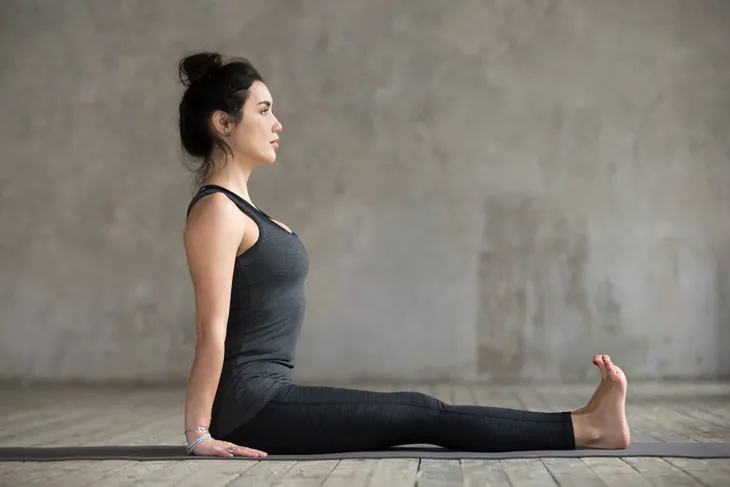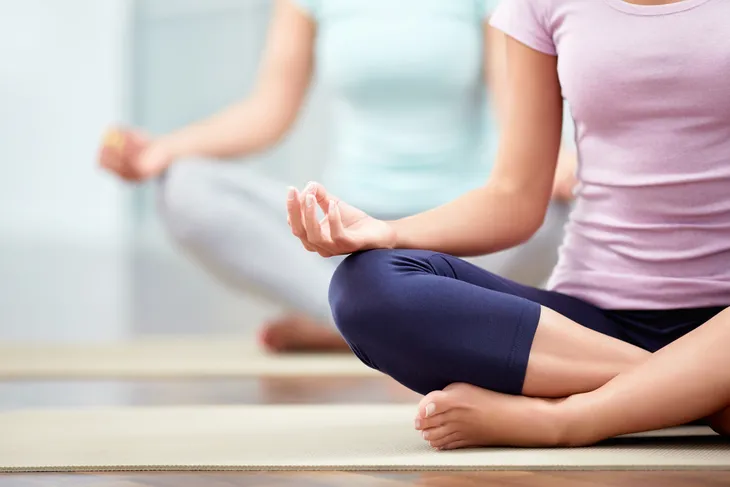I’m a big fan of yoga. No surprise there. I maintain a regular yoga practice for so many beneficial health reasons—to lower anxiety, to strengthen and tone, to protect my joint and bone health, etc.
However, studies link a regular yoga practice to many age-defying properties, helping prevent disease as it promotes youthfulness…
Yoga Reduces Blood Pressure
Good news for folks with a family history of high blood pressure—yoga has been linked to fighting hypertension by a group of researchers out of the University of Pennsylvania
The study monitored the blood pressure readings of 58 women and men, aged 38 to 62, for a period of 6-months. In participants who practiced yoga 2 to 3 times weekly, blood pressure readings dropped from 133/80 to 130/77, on average.
Yoga Diminishes Back Pain
Lower back pain is a common and chronic issue among the aging population. Thankfully, a 2014 study published by the International Journal of Yoga found that Iyengar yoga can help with pain relief.
Study participants with a history of chronic lower back pain committed to a series of Iyengar yoga stretches. They performed yoga 5-days per week, for a period of 4-weeks. Findings reported a 44-percent improvement in back pain intensity.
Yoga Prevents Diabetes
When it comes to managing glucose levels, diabetes patients often struggle. However, an Indian study conducted in collaboration by the Srinivas Institute of Medical Science and Research Centre and Kasturba Medical College and Hospital, at
Manipal University, found that yoga helped control glucose levels and oxidative stress in type 2 diabetic patients. The study monitored 123 diabetic patients and reported a significant decrease in overall BMI, as well as better overall glycemic control.
Yoga Strengthens Immune Health
With the pending cold and flu season looming, yoga may be a more natural option to help ward off fall and winter illness. According to research published by the National Institutes of Health (NIH), a regular yoga practice reduces immune-lowering cortisol in the body.
The study compared 30 individuals who practiced yoga for 35-minutes daily for 12 weeks. Compared to a control group of 30 individuals who did no yoga, the yogis experienced reduced cortisol emission during stressful situations. Cortisol is linked with weakening immune health.
Yoga Banishes Tummy Bulge
Ladies, if you’re trying to shed a stubborn tummy bulge—yoga may help, according to research from the American Journal of Managed Care. The study acknowledges that any type of yoga can help, but used restorative yoga for this purpose.
Findings showed that female yogis experienced reduced stress (and cortisol levels) and reported significant subcutaneous fat loss. Cortisol, the stress hormone, is directly linked to the accumulation of tough-to-melt, subcutaneous, abdominal fat.
Yoga Fosters Youthfulness
Yoga might be the next “fountain of youth,” according to a group of scientists at University of California, San Francisco (UCSF). The pilot study monitored a variety of stress management techniques, dietary changes, and exercise habits that promoted longer telomeres.
Scientists point out that telomeres exist in DNA chromosomes and directly influence aging. Dr. Dean Ornish, UCSF’s Clinical Professor of Medicine, claims the study proves that “Our genes, and our telomeres, are not necessarily our fate,” and factors like diet and exercise (i.e., yoga) can promote longer, healthier life.









